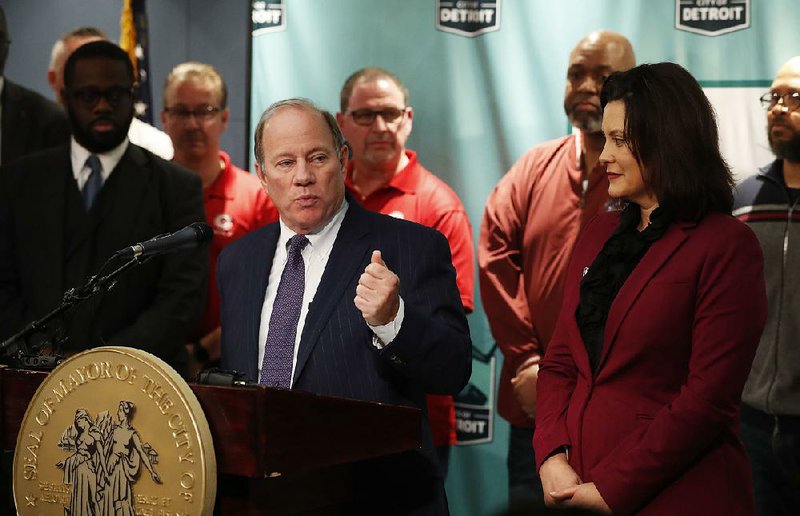DETROIT -- Fiat Chrysler on Tuesday announced a $4.5 billion investment plan it said would increase its workforce in Detroit and the surrounding suburbs by about 6,500 jobs to build new or next-generation SUVs, in a move touted by officials as an uncommon opportunity to revive the regional economy.
Under the plan, the company said it would reopen a shuttered engine plant in the city and convert another in the same complex into an assembly plant for the Jeep Grand Cherokee and a new, three-row, full-size Jeep SUV and plug-in hybrid models for all.
While moving forward, it also took a step back, trimming operations at an Illinois plant by cutting almost 1,400 jobs.
The announcements came as the other big American automakers, General Motors and Ford, have been cutting jobs and production. But Mike Manley, Fiat Chrysler's chief executive, said he was confident that the U.S. economy would remain on track. "The economic indicators as we see them are still strong," he said in a conference call with reporters.
Detroit was once home to about a dozen large automobile production plants, but a series of closures helped push Detroit's unemployment rate to a peak of almost 29 percent a decade ago. The new Chrysler plant would be the first built in Detroit since 1991 and is expected to add 3,850 jobs. The company said in a news release that it would add 1,100 new jobs at its Jefferson North Assembly plant in Detroit, and roughly 1,500 jobs at facilities in the neighboring suburb of Warren. The investment would roughly double the company's hourly workforce in the city.
Speaking at a news conference after the announcement, Detroit Mayor Mike Duggan called the deal a "once in a generational chance to change the economic" fortunes of Detroit. Gov. Gretchen Whitmer said it has been a long time since Michigan has seen an automotive investment as "big and transformative" as Fiat Chrysler's plan.
The investment will also have a ripple effect, boosting the automotive industry and helping other non-auto businesses elsewhere in Michigan and other Midwest states, Whitmer said.
Fiat Chrysler said the additional investments are subject to tax incentive packages it was working out with the city and state. The automaker would need about 200 acres of land for the project.
City officials signed a memorandum of understanding with the automaker, and they were ironing out a deal to assemble land for the project over the next 60 days.
If enough land is acquired and the tax incentives approved, construction is expected to start later this year. The first new vehicles could be in production by the end of 2020.
The automaker's injection of money and jobs into the Motor City contrasts sharply with news from rival General Motors Co., which announced plans to shutter its Detroit-Hamtramck plant next year and plans to close four others in the U.S. and Canada.
But while Fiat Chrysler is expanding in Michigan, it said it would fire 1,371 of the 5,464 workers at its plant in Belvidere, Ill., or about a quarter of the work force there. The factory, where the company makes Jeep Cherokees, currently employs three crews of workers and runs two 10-hour shifts a day, six days a week. The job cuts take effect May 6, after which the plant will operate two eight-hour shifts, five days a week.
A Fiat Chrysler spokesman said the carmaker had no plans to transfer Belvidere workers to the Michigan plants where jobs are being added.
Detroit officials insisted they would help draw those 5,000 new jobs to the city without displacing any residents. In the early 1980s, thousands of people were relocated and a black and Polish neighborhood known as Poletown was razed for what became GM's Detroit-Hamtramck plant.
Company officials said SUVs remain in demand, with strong sales and growth potential in domestic and overseas markets. The company's chief financial officer told investors in June that trucks and SUVs would account for 80 percent of revenue by 2022.
Union leaders praised the announcement.
"It is especially exciting because these are good union jobs that have been achieved through collective bargaining," United Auto Workers Vice President Cindy Estrada said in a statement. "We now look forward to working with the city and other community leaders on a community benefits agreement that reimagines our city and empowers our citizens to create sustainable communities with long-term viability."
Detroit's history has long been intertwined with the U.S. auto industry, with its attendant peaks and valleys.
Historically, Detroit's job losses have been reflected in its plummeting population. About 1.8 million people lived in Detroit in the 1950s, and Detroit was the nation's fourth-biggest city in 1960. By 2016, it would rank 21st as tens of thousands from the middle class fled to the suburbs. More whites moved away after a riot in 1967. The black middle class made a similar exodus in the next decade.
About the same time, the car plants that provided jobs and helped keep the city running were hiring fewer people. Around 1970, Detroit's unemployment rate was just over 7 percent. It reached 25 percent by 1990. In 2009, the unemployment rate was close to 29 percent.
Today, Detroit has fewer than 700,000 residents. But the city's unemployment rate last fall was down to about 8 percent.
Information for this article was contributed by Jeff Karoub, Corey Williams and David Eggert of The Associated Press and by Neal E. Boudette of The New York Times.
Business on 02/27/2019
